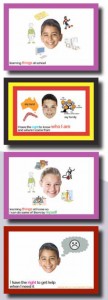The Charter of Rights guarantees important rights for all children and young people in care.
The question facing the Guardian’s Office, among many other agencies, is what is the best way to help children in care with disabilities or low literacy understand their rights and to support them and their carers in advocating for them.
Consultant Lis Burtnik spent many hours talking to carers and children and exploring good practice elsewhere.
Not a surprise, she found that the most effective ways to inform children and young people with disabilities involves the active participation of carers. Where carers are on-side and involved, the learning is more likely to happen. Additionally, carers said that, by working with the rights themselves, they are more able and more likely to advocate with and for young people.
The reference group provided expert advice on what Lis learnt and the potential uses of new materials.
 In the end, flash cards proved to be the best option for presenting the messages. They are simple and reliable with no setup, logon or batteries to go flat and are available in an instant. The material can be used at almost any time and in any place, as the opportunity offers, and packed away as interest wanes. Flash cards can also be personalised very simply by sticking on pictures of children themselves and people and objects important to them.
In the end, flash cards proved to be the best option for presenting the messages. They are simple and reliable with no setup, logon or batteries to go flat and are available in an instant. The material can be used at almost any time and in any place, as the opportunity offers, and packed away as interest wanes. Flash cards can also be personalised very simply by sticking on pictures of children themselves and people and objects important to them.
The flash cards, of which some early drafts are pictured at right, involve and reinforce the all-important connection between carer and child, drawing on shared experiences and the carer’s insight into each child’s way of understanding the world. They also enable young people with the skills and motivation to work on them independently.
The cards themselves are a major design exercise, six sets covering three ability groups for girls/young women and boys/young men. Abstract ideas such as privacy and safety are captured by making use of symbols, depending on the age group and skills. Each set is made to articulate to the other sets to allow young people to move on as they mature.
A booklet for carers accompanies the boxed set of cards and contains some of the ideas and suggestions for the cards’ use that Lis collected in her conversations and research.
The 37 rights in the Charter are simplified and distilled into seven messages for the flash cards, capturing the essence of the rights while eliminating some of the nuance and repetition in the original.
Reviewing the cards, Guardian Pam Simmons said, ‘I was concerned that we were not seen to be re-writing the Charter. I am happy now that we have captured the important messages from the Charter in these new materials and made it available to a very important audience.
‘We hope that carers will come to own the rights project so that the materials become a living resource enriched and refined by their knowledge and feedback.’
The card sets will be available later in the year.
Follow the development of these products on Twitter.
